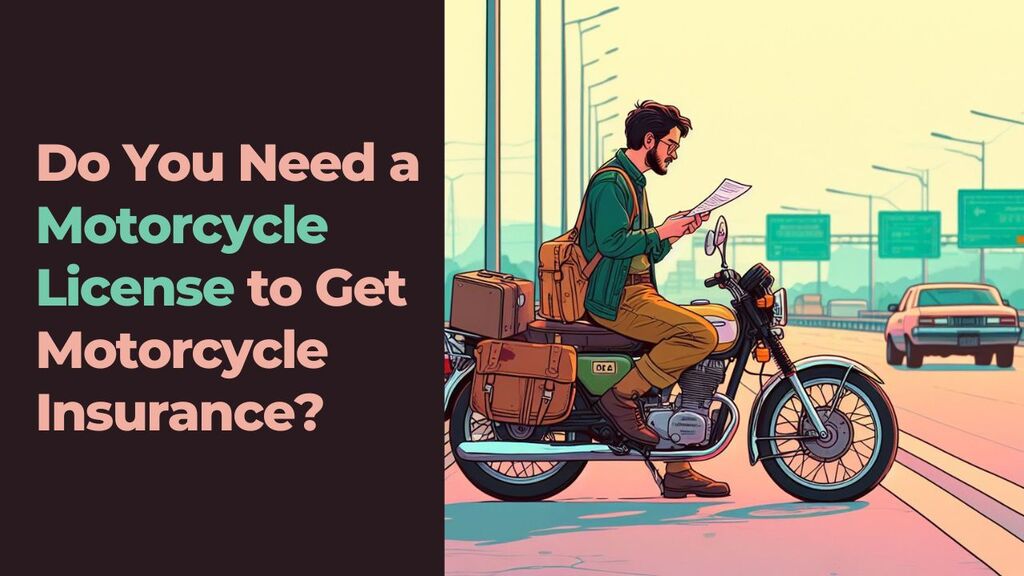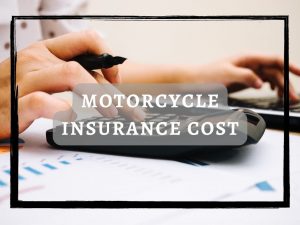Ever found yourself loving a new bike before getting your license sorted? Or just wanting theft coverage on a prized collection? Do you need a motorcycle license to get motorcycle insurance?
I’ll spill all the secrets insurance companies don’t want you to know. So you want to keep your hogs street legal without docs? Stick around and prepare to be schooled in how to fly under the radar…safely.
Motorcycle Licensing Requirements
Licensing requirements can seem like a drag, but they’re important for your an other’s safety on the road.
First thing’s first – the type of license you need depends on the type of motorcycle you wanna ride. In most states there are three main categories:
- MThis lets you ride any two or three-wheeled motorcycle. It gives you the most freedom to hop on whatever bike strikes your fancy.
- M2Only lets you ride two-wheeled bikes. This is good for starting out on a smaller motorcycle before moving up to a bigger one.
- M3Only for three-wheelers like a Can-Am Spyder. These are a nice step for folks who still wanna enjoy the wind but want some extra stability.
Each state has their own rules, but usually to get your first license you’ll need to grab a learner’s permit. It acts like a training permit; a good way to get comfortable on two wheels before taking the test.
To qualify for your permit, expect a short written test at the DMV. It’ll cover the basic rules of riding like signaling, lane positioning, and safety gear. Nothing too crazy, just use some common sense. Oh and you usually need to be over 16 years old.
Once you’ve had your permit for anywhere from 30 days to 6 months depending on the state, it’s time for your skills test. This hits the roads to check you can control the bike, maneuver through cones, and do an emergency stop. As long as you’ve practiced, it’s a breeze!
And just like that, you’ll be riding with your official M endorsement on your license. Keep those skills sharp with regular practice and you’ll be carving canyons in no time.
Steps to Obtain a Motorcycle License
Let me break down exactly what you need to do to earn your license.
The first thing is getting your learner’s permit. Head to the DMV with your driver’s license and about $30-50 depending on your state. They’ll ask you to take a short, multiple choice written test about basic riding rules. It’ll be about things like hand signals, speed limits, and drinking/riding laws.
PRO TIP: If you’re nervous, definitely grab the handbook and study up a bit first. Don’t want to get tripped up on something silly!
Once you pass, they’ll hand you that permit which is like a training wheel for hitting the road. From there, I totally recommend taking a riding safety course. The classes cover everything from pre-flight checks to braking maneuvers to swerving skills. Best of all, they provide the bikes so you don’t need your own to practice. I met some awesome riders in my class too.
Most states will waive your road test fee if you get certified through one of the programs. Definitely worth the small investment to up your skills before putting them to the test, if you know what I mean!
At last, it’s time for the big show; your road exam. Find a licensed rider friend to chauffeur you and the bike to the testing site. They’ll check your clutch control, steering abilities, and emergency stops. Go through the cones without putting a foot down and you’re golden.
Just remember to signal, check your blind spots, and obey all traffic laws. The proctors aren’t looking to fail you; they just want to see you’re competent and safe.
Implications of Riding Without a License
It’s super important we all ride legal. The laws are there to keep us safe, and there can be some nasty consequences if you’re out there without the proper endorsements.
For starters, it’s illegal in every state – no ifs, ands or buts about it. In some places they’ll slap you with a hefty fine for being unlicensed. We’re talking hundreds of dollars here, and it goes up if you’re a repeat offender.
Then there’s always the risk of your bike getting impounded. Nobody wants to leave the dealership feeling on top of the world, only to have their shiny new ride immediately towed by the cops. And good luck getting it back without some serious cash.
In the worst cases, they may even take you down to the station. Riding dirty runs the risk of jail time depending on the state. Spending the night in the slammer totally kills the vibe, know what I’m saying?
It gets problematic if you’re in an accident too. If it’s deemed your fault for being unlicensed, insurance probably won’t cover anything. That medical bill for the other guy is coming straight out of your pocket.
My advice? Just take the time to do it right from the start. Get those permits, finish the safety courses, then nail the test. It protects you legally on the road, helps get cheaper rates on insurance down the line too. Not worth the headache of getting popped without the proper paperwork. Ride smart; ride legal!
Reasons Why Insurance May be Needed Without a License
Some situations call for insurance even if you don’t have your license yet. Let me tell you about a couple.
Theft Protection for Non-riding Bikes
If you’re a collector with a stable of vintage beauties, chances are you’re not ripping up the track on a 50-year-old Softail. But wouldn’t it be a bummer if one of your prize hogs got swiped from the garage? Insurance protects your investment from theft.
I knew one guy with a whole row of pristine Harleys from the 70s, all dressed in their original leather. Would’ve broke his heart to find an empty spot, so he kept full coverage on the lot. Small price to pay for peace of mind, if you ask me!
Insuring a Bike for Another Rider
You might insure a bike for a family member. I’ve seen more than a few folks put their sweet ride in the old lady’s name since her credit was better for financing. As long as she’s got the license and you don’t rack up tickets on her policy, it works out fine.
Then there was my buddy Jed – he bought his son’s first bike as a high school grad gift. Kid was overwhelmed and wanted to take the safety course first before getting on the road alone. No problem! We insured it under Jed so the bike could sit pretty in the driveway until he earned his stripes.
Moral of the story – insurance ain’t just for licensed riders. Find the right coverage and it’ll protect your investment no matter whose name is on the papers.
Owning a Bike Before Getting Licensed
I’ve seen plenty of folks swoon over a new ride, whip out the wallet, and push it home before stopping to think about licensing details.
No worries – any good insurer knows buyers’ remorse ain’t worth a wrecked cruiser. They’ll insure your new baby for those few weeks before you hit the books and schedule the road test. Just be sure to follow all the rules till you get your endorsement in hand!
Suspended/Lapsed License Requiring Coverage
And what if yours gets suspended in the meantime? We’ve all had a close call that could’ve taken our license – pothole, gravel slide, kamikaze squirrel. Doesn’t mean you wanna leave the iron untouched for months.
Basic liability is smart, so if the worst happens you’re covered while you get your skills back up to snuff. SR-22 forms are good for filling that legal requirement too. Bike sits pretty at home until the suspension’s up and you can ride free again!
Do You Need a Motorcycle License to Get Motorcycle Insurance? Learn the Options
No, you don’t need a motorcycle license to get motorcycle insurance. However, things are not plain and simple here. There could be some conditions to obtain an insurance when you don’t have a license.
So, if you find yourself in a license-less situation, there are still ways to protect your ride.
Insuring the Bike Instead of the Rider
Some companies let you insure the bike itself instead of a particular rider. As long as it’s not being loaned out to just anyone, this covers damage or theft no matter whose leg is over the saddle.
Just disclose if multiple household members plan to hop on occasionally so rates reflect that. And of course, only licensed folk should be hitting the road legally. But it takes the personal risk factor out of the equation.
Specialty Insurers for Higher-risk Policies
Another option is going with a specialty insurer. These guys deal with higher risk clients all the time, so they know the ins and outs of insuring without proper credentials.
Just be ready for pricier premiums since they see unlicensed riders as a bigger liability. But the peace of mind is worth the cost until you get things sorted with the DMV.
Always be upfront about your situation too. Hiding info is the fastest way to get dropped when you need coverage the most. These insurers work with riders of all experience levels, so you can easily find one.
Excluding the Unlicensed Owner
If you own the bike outright but don’t have your class M yet, see if the company will omit your name specifically.
Their biggest concern is high-risk rides, so as long as someone over 21 with a clean record is the primary operator, they may bite. Just don’t go speed demon the first chance you get afterwards!
I’ve even seen joint policies work where different members are excluded at different times, like when one gets their permit and the other is riding mostly.
Factors Affecting Insurance Rates Without a License
There are a few more things insurers will take a look at besides your licensed status. Your history behind the wheel or on two wheels counts for a lot.
Driving History, Credit, and Place of Residence
If your driver’s record is spotless with no tickets or accidents, that works majorly in your favor. Shows you’re responsible and rates will reflect that.
But we all know Jerry with the lead foot – 3 speeding tickets and a fender bender last year ain’t helping his case! Premiums will hike up if you’ve got a reckless streak. So slow your roll till the license is solid.
Credit scores also come into play like I mentioned before. Insurers know folks with money problems may be more likely to chase claims or let a policy lapse. You must keep making those payments on time.
And where you park your bike at night affects the price too. Rates tend to be higher in cities than rural areas since there’s more traffic and theft risks in urban jungle. Shore up that security if living somewhere sketchy!
End of the day, a clean past and responsible financial habits will get you the best non-licensed rates possible.
Higher Costs
Alright guys, no secrets – insuring without your class M will definitely cost more green. But there are some tweaks that can make the premiums more manageable.
First off, companies see unlicensed riders as riskier since you haven’t proven your skills to the state yet. So rates will usually come in higher than your licensed buddies no matter what. It is what it is!
Some good news though – your other stats still count. Things like your years of riding experience, your driving record, and any safety courses you’ve taken can offset that risk factor slightly.
Your credit also plays a role, believe it or not. Insurers know more responsible folks are less likely to do something dumb and file a claim. So make sure those payments are all up to date.
It also helps immensely to have a concrete plan and timeline for your license! Show them the dates you registered for your permit test and safety course. Prove you’re being proactive instead of just riding dirty long term.
Little things like agreeing to only log supervised miles can bring premiums down too. The key is proving to the insurer this is a temporary thing till you get credentialed properly. Rates go up every time they renew you license-less!
What Are the Requirements for Minimum Coverage?
Now we know the options to get coverage without a license, but no bike is really insured unless you meet the basic minimums required by law.
Liability for Injury and Property Damage
Liability insurance kicks in to cover medical bills or repairs if you damage someone else’s property. It’s what protects you from getting sued into the dirt if an accident is your fault.
State minimums vary, but most require at least $15-25k in bodily injury coverage per person, with about the same for total injuries from one crash. Property damage coverage usually sits around $10-15k as well.
Collision and Comprehensive Coverage
I highly recommend adding comprehensive and collision coverage too if you can swing it. Comp protects against theft, vandalism or acts of nature like a fallen tree or hailstorm busting your pipes.
Collision covers repairs if you drop the bike or have a single-vehicle incident. You’ll be on the hook yourself otherwise, and those repairs can be a pretty penny!
It’s easy to focus on just the minimums since you’re budget-minded without a license. But trust me, you’ll sleep better at night fully covered. The premiums are way cheaper than an out-of-pocket fix if Murphy’s Law strikes.
Moped/Scooter and Motorcycle Policies
Moped and motorcycle policies ain’t always the same thing. And that matters a ton when insuring without a license.
First off, mopeds are generally defined as two-wheeled rides under 50cc that can be pedaled as well as having a motor. Scooters are usually 50cc and over but don’t require licensing.
Meanwhile, your average Harley is definitely a motorcycle. So if insuring one of those, you’ll need full motorcycle coverage and endorsements.
The major difference is that mopeds and scooters sometimes only require basic liability insurance same as a car. No special licensing or endorsements necessary. Great if you just wanna tool around locally without all the red tape.
However, motorcycles always demand full motorcycle policies with that class M credential (or your state’s equivalent) on your license. No way around it if street riding legally.
Also, moped premiums are typically cheaper than motorbikes. Less risk of high speeds and accidents.
FAQs About Motorcycle License and Insurance
What if I recently sold my bike but still have a policy active?
Notify your insurer right away that the bike is no longer in your possession. They may lower your rates or cancel coverage since the risk is gone.
Can I insure my bike as a collector item if it’s not ridden?
Yes, comprehensive-only policies are available for cherished vintage bikes kept in storage. Premiums are much cheaper since there’s no riding risk.
I’m taking the safety course but won’t be licensed for a few weeks. Am I covered?
As long as your timelines are reasonable and a licensed friend helps in the meantime, most insurers will cover the short gap period.
What if I get my license suspended – can I still insure the bike?
Yes, companies offer SR-22 filings and liability-only plans to satisfy legal requirements while your license is down. The bike just can’t be ridden until reinstated.
If I insure through my household, do I need to be named on the policy?
No, insuring the vehicle itself is enough. But be honest about all potential riders so rates account for the increased risk of permissive use.




